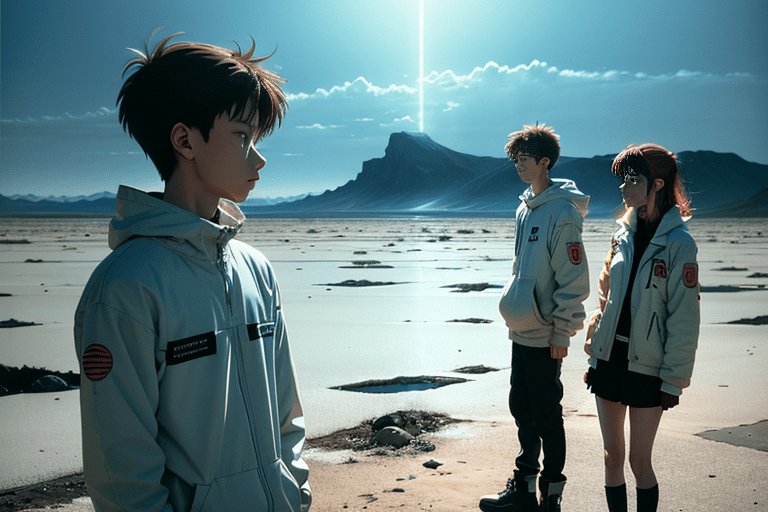Neon Genesis Evangelion and the Search for Meaning in a Meaningless World

Neon Genesis Evangelion is a complex and introspective anime series that explores the search for meaning in a world that seems utterly meaningless. The story follows a group of teenagers who are forced to pilot giant humanoid robots, called Evangelions, in order to defend Earth against mysterious and powerful beings known as Angels. But beyond the sci-fi action and stunning animation, the series delves deep into the human psyche and explores some of the most profound questions about existence, purpose, and identity.
At the heart of Neon Genesis Evangelion lies the question of meaning: What is the meaning of life? What is the purpose of our existence? These are age-old questions that have puzzled philosophers, theologians, and scientists for centuries. In the world of Evangelion, however, the question of meaning takes on a particularly urgent and pressing dimension. The world is in chaos, the human race is on the brink of extinction, and everything that the characters once held to be true and meaningful has been stripped away. In this context, the search for meaning becomes a matter of survival.
The central character of Neon Genesis Evangelion is a teenage boy named Shinji Ikari, who is recruited by his father to pilot one of the Evangelions. Shinji is initially reluctant to take on this responsibility, but he eventually becomes deeply committed to his role as a defender of humanity. However, as the series progresses, Shinji begins to question the purpose of his existence and the value of his own life. He struggles with feelings of loneliness, alienation, and despair, and he is haunted by a sense that his life is utterly meaningless.

Shinji’s struggle to find meaning in his life is mirrored by the struggles of the other characters in the series. Asuka Langley Soryu, another teenage pilot, is driven by a fierce desire for recognition and validation. She seeks to prove herself to others and to find a sense of purpose through her role as a pilot. Rei Ayanami, the third pilot, is initially emotionally detached and seemingly devoid of any sense of purpose or meaning. She appears to be little more than a puppet controlled by others. But as the series progresses, Rei begins to develop a sense of self-awareness and autonomy, and she begins to question the nature of her existence and the meaning of her life.
One of the most intriguing aspects of Neon Genesis Evangelion is the way in which it blends elements of science fiction, psychology, and religion to explore the question of meaning. The series draws on a wide range of philosophical and religious traditions, including Buddhism, Christianity, and the writings of Friedrich Nietzsche, to create a rich and complex tapestry of ideas and themes.

In particular, the series explores the concept of the “hedgehog’s dilemma,” a metaphor introduced by philosopher Arthur Schopenhauer to describe the inherent tension between human beings’ desire for intimacy and their fear of being hurt or rejected. This idea is manifested in the relationships between the characters in Neon Genesis Evangelion, as they struggle to form meaningful connections with one another while also protecting themselves from emotional pain.
The series also explores the idea of the “collective unconscious,” a concept developed by psychologist Carl Jung to describe the shared, universal aspects of the human psyche. This idea is embodied in the mysterious and enigmatic character of Kaworu Nagisa, who seems to possess a deep and intuitive understanding of the human condition and the nature of existence.

Ultimately, the search for meaning in Neon Genesis Evangelion is an intensely personal and subjective journey. Each character must grapple with their own sense of purpose and identity, and each must find their own way forward in a world that seems to offer no clear direction or guidance. The series offers no easy answers or simplistic solutions, but instead presents a complex and nuanced exploration of the human condition.
Neon Genesis Evangelion is a masterpiece of anime storytelling that tackles some of the most profound questions about the human experience. Through its exploration of the search for meaning in a meaningless world, the series offers a profound meditation on the nature of existence, purpose, and identity. Its rich tapestry of ideas and themes draws on a wide range of philosophical, psychological, and religious traditions to create a thought-provoking and emotionally resonant work of art.

Whether you are a longtime fan of the series or a newcomer to its world, Neon Genesis Evangelion is an anime that demands your attention and your contemplation. Its complex characters, stunning visuals, and provocative ideas make it a true classic of the genre, and its exploration of the search for meaning in a meaningless world will leave a lasting impression on anyone who experiences it. So if you’re looking for a deeply rewarding and intellectually stimulating anime, look no further than Neon Genesis Evangelion.







